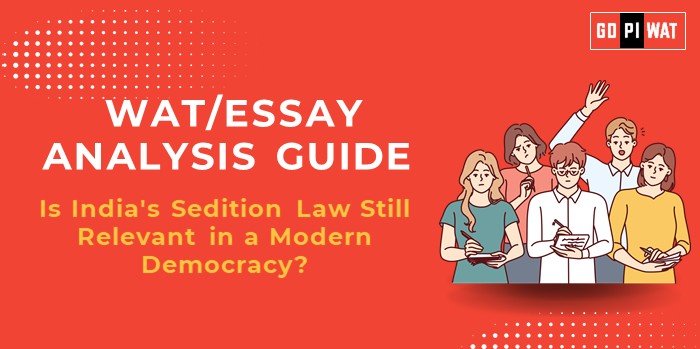📋 WAT/Essay Analysis Guide: Is India’s Sedition Law Still Relevant in a Modern Democracy?
🌐 Understanding the Topic’s Importance
The relevance of India’s sedition law lies at the intersection of governance, security, and civil liberties, making it a critical subject for understanding democratic functioning and policy reforms.
📖 Effective Planning and Writing
⏳ Time Allocation (30 Minutes):
- 📚 Reading & Planning: 5 minutes
- ✍️ Writing: 20 minutes
- 🔍 Review: 5 minutes
📋 Structure (500 Words):
- 📜 Introduction: 60-70 words
- 📖 Body: 350-375 words
- 🖋️ Conclusion: 60-70 words
💡 Introduction Techniques
- 🔄 Contrast Approach: “While sedition laws have historically maintained national security, their misuse has sparked debates on their place in a vibrant democracy.”
- 📜 Timeline Approach: “From a colonial-era tool in 1870 to a contentious issue in 2024, the sedition law’s trajectory mirrors India’s evolving democracy.”
📚 Structuring the Essay Body
🏆 Achievements:
- 🛡️ Highlight successes like curbing separatist movements and addressing insurgencies.
⚠️ Challenges with Comparative Analysis:
- 📉 Emphasize misuse, such as targeting dissenters and stifling free speech.
- 🌍 Compare with democracies like the UK, which repealed sedition laws in 2009.
🚀 Future Outlook:
- ⚖️ Propose redefining the scope of sedition to focus on genuine threats to national security.
- 📢 Recommend safeguards to prevent misuse, such as judicial oversight and guidelines.
📝 Concluding Effectively
⚖️ Balanced Approach:
“Revisiting the sedition law ensures India’s democracy grows while safeguarding national unity.”
🌏 Global Perspective:
“India’s approach to sedition must reflect its democratic ethos, aligning with global standards.”
🔍 Analyzing Successes and Shortcomings
- 🏅 Key Achievements: Preservation of sovereignty and deterrent to anti-national activities.
- 📉 Ongoing Challenges: Judicial overload and the chilling effect on dissent.
- 🌍 Global Context: Democracies phasing out sedition laws while addressing security through alternate frameworks.
📈 Recommendations for Sustainable Progress
- 📝 Redefine the scope of sedition to target only serious threats to sovereignty and integrity.
- 📢 Establish safeguards like judicial oversight to prevent misuse.
- 📚 Promote civic education to strengthen democratic norms and reduce reliance on punitive measures.
✍️ Sample Short Essays
- ⚖️ Balanced Perspective: “India’s sedition law has played a role in maintaining sovereignty, but its misuse stifles democratic dissent. As India aspires to global leadership, revisiting colonial-era laws is crucial.”
- ✅ Solution-Oriented: “Reforms in the sedition law, focusing on national security and free speech balance, can strengthen India’s democracy.”
- 🌍 Global Comparison: “With nations like the UK repealing sedition laws, India must modernize its approach to uphold democratic values.”


